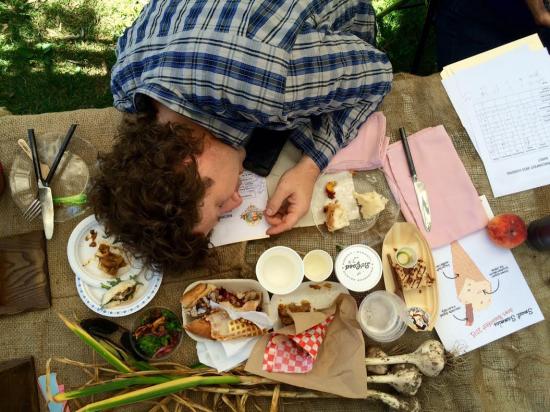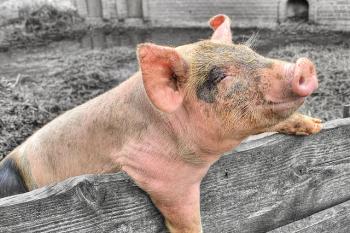Please support our coverage of democratic movements and become a supporter of rabble.ca.
Bacon may not be all it's sizzled up to be, but it does explain a whole rasher of things about today's food scene.
I got to experience the bacon back story on August 8, as one of four judges at a BaconFest2015 celebration at east-end Toronto's neighbourhood-based Leslieville Farmers Market.
I was the spoilsport, asking questions about the sustainability of each dish, while my fellow judges had the tastebud chops to evaluate flavor and aroma, texture and body, presentation and, of course, bacon-ness.
Overhearing comments from the tried-and-true baconista on the judging panel, listening to market volunteers who chased down answers to any questions I asked, as well as participant observation (aka eating) of 13 bacon dishes in a row taught me more than I ever hoped to know about how long digestive systems take to heal after an episode of pigging out, why junk foods appeal to almost everyone, and what neighbourhood farmers markets do to bring foodies (gourmets, food lovers) and foodists (policy wonks and activists) together.
To be honest, my tastebuds are so dull I can barely relate to the way people get all worked up over the likes of chocolate or bacon. So I appreciate the new words put in my mouth, which I can now add to my praise for a cook, beyond my previous standard of saying the dish tastes "really good."

Patrick, who sat to my right, is a respected local oyster shucker, who built up his taste IQ by learning to identify as many differentiating tastes among oysters as wine afficianados can spot among wines. Though I felt nervous sitting next to a bacon hoarder, Pat was actually able to coach me into recognizing how the smoke from the top contestant's bacon could sneak up behind the smooth creaminess of bourbon icecream to wallop me in the nose with its bacon-ness.
Charlotte, sitting to my left, is a much-praised teacher of fruit preserving. She taught me to think about bacon tastes in terms of a meaningful, though lustful, relationship. She identified the taste of the top contestant's bacon collage as "yielding." The test to knowing if you are in a serious relationship with a bacon dish is to feel you would love to eat it in bed, she told me.
Joel, on the far end, had his way with all the bacon dishes, but fancied most the ones that had fairy dust and antioxidants sprinkled on top of serious bacon. A consultant for small companies hoping to grow, he recognized almost all the specialized suppliers of the 13 contestants -- a sure sign that artisans, not factory machines, are bringing home the bacon here.
Sarah, the volunteer who researched suppliers for us, called what she was doing "playing local famer scrabble," a popular game among food enthusiasts.
The access to local and sustainable pork tells a story of its own. Despite their lowly status, pigs are among the cleanest and smartest animals in creation, and also quite amenable to low-impact and sustainable practices. They can fend for themselves in pastures and forests, and fatten on food scraps (cobs of corn, for example), culls (off-sized apples or excess milk, for instance) and leftovers from meals. They can convert waste products into high-quality protein for humans, as well as manure for either fertilizer or biogas energy production -- thereby offsetting any negative environmental impacts on the landscape.
Environmentalists may well criticize the cruelty imposed on pigs by factory farming methods, but they have a harder time critiquing pigs, as distinct from industrial agriculture, as unsustainable.
Less is more approaches to cooking lend themselves to bacon, which supplies the salt to offset too much sweetness, as well as the chunkiness and crunchiness to offset too much creaminess in ice cream or chocolate -- the qualities that led to the prize-winning bacon collage submission by Sweet Sammie's in Leslieville.
The fact is that bacon serves as methadone for those addicted to junkfood. Salt, sugar and fat, the staples of junkfood, are wired into human cravings because they were once (until 75 years ago) as difficult and unaffordable to find in any quantity as they were essential to nutrition in small quantities.
Bacon can deliver these flavors, and the nutrients behind them, in bits and pieces added to homemade lentils or salad. But the Market is honouring cooking professionals, who offer bacon rainbows at the Market and in their shops along Queen Street East, Leslieville's main street.
One of these shops, Eastside Social, offered a jerk bacon sandwich, in which small servings of bacon stood out amidst plentiful salad ingredients and a multicultural sauce -- a fusion bacon medley.
The health (as distinct from narrowly nutritional ) picture around bacon has to be rounded out by noting that 4500 people came to enjoy a bacon-themed day at a neighborhood-scaled farmers market. The Leslieville Market adds economic health to the main street, where many of the market's artisanal vendors work during the week. There's also value added to the neighborhood, which gets to enjoy free time outdoors, a chance to enjoy music by skilled buskers, that food is an occasion for community celebration and placemaking -- the new tool for building the commons behind community.
That's something worth going whole hog for.

Please support our coverage of democratic movements and become a supporter of rabble.ca.
Main image: Flickr/Maurice
Other images: Wayne Roberts




Comments
Do
Don't